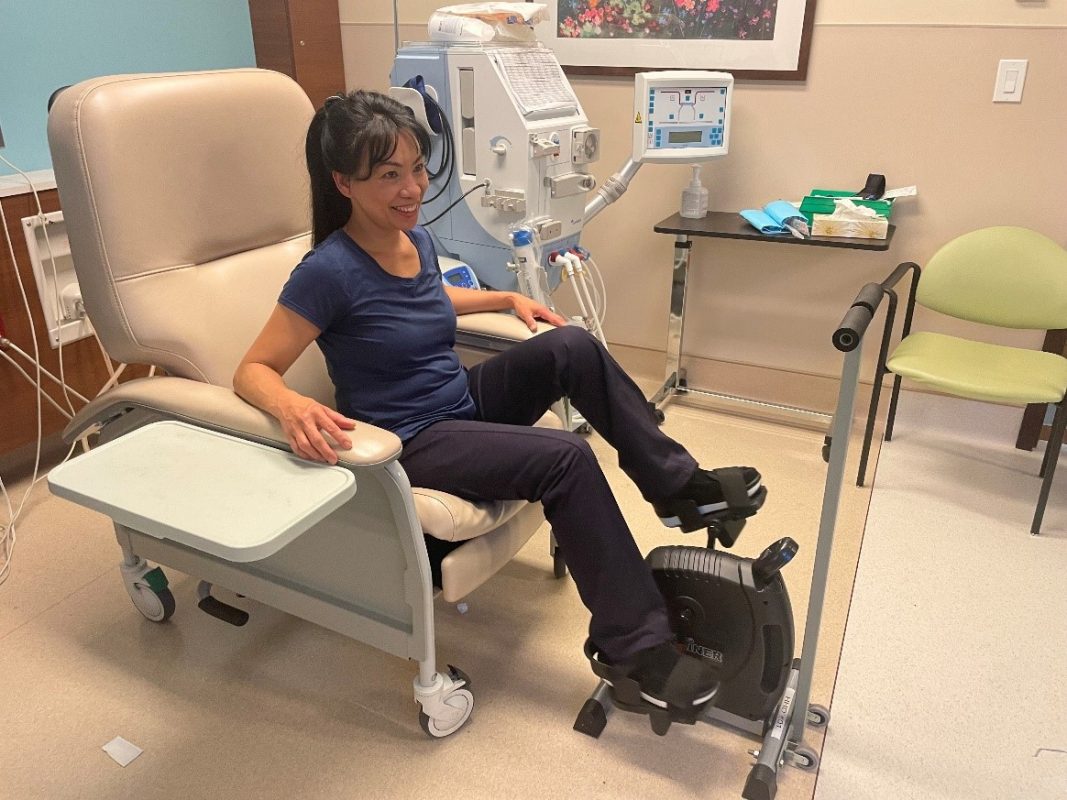The Fraser Health Renal Program reached out to Garrett Kryt, Research Associate, MAKE+, BCIT Applied Research, to see if BCIT could assist them in making a special kind of bike – one that would help patients on dialysis and also be safe for staff to move on their own around the dialysis units.
According to the Canadian Institute for Health Information, nearly 30,000 people received dialysis treatment in Canada in 2021. These treatments need to be done three times a week, with each session lasting around four hours. The long process of removing toxins and excess fluid leaves patients feeling drained and with minimal time for physical activity.
BCIT MAKE+, a group of multidisciplinary researchers, utilized plans from a similar project in Alberta to modify small pedal bikes typically used under a desk in a workplace setting. These kinds of bikes are also often used in rehabilitation and physical therapy, as users are able to isolate muscle movement and provide low-impact exercise in a compact setting. MAKE+ researchers adapted these bikes in a number of ways – including adding a long handle and wheels. This allows the 13 pedal bikes to be more easily moved from patient-to-patient in a dialysis unit without staff members having to pick up the bike and risk a workplace injury.
“This collaboration and partnership with BCIT MAKE+ has allowed us to implement a solution will allow staff to promote exercise during dialysis in a timely and efficient manner,” said Elaine Aure, Director, Renal Program, Fraser Health. “The creation of these handles allows staff to safely bring the bikes to and from patients promoting the use of them and improving patient outcomes.”
Being able to exercise with these adapted bikes while getting dialysis treatment is beneficial for a number of reasons, according to Garrett. Biking on dialysis helps to reduce muscle cramping, manage blood pressure, and improve energy levels and mood of dialysis patients. Research and interest about the benefits of intradialytic exercise is growing and so is the market for specialized exercise solutions.
While Garrett says his team typically doesn’t take on pure fabrication projects such as this, he decided to move forward after seeing the benefit it would bring to patients.
Have you subscribed? Sign-up to receive the latest news on BCIT.
BCIT MAKE+ focuses on projects that are related to health technology and assisted devices. The team has supported numerous industry partners in making prototypes that provide a better quality of life, including a therapeutic baby-calming robot for use in hospitals, an innovative device to improve chest tube stabilization for patients, and a dog wheelchair. The MAKE+ sub-group PART (Product and Process Applied Research Team) is the only academic product development group in Canada registered to IS0 13485 (Medical Devices) Quality Management Systems.
“Having this certification as a polytechnic Institute is really unique, and it provides a lot of value to our clients and students,” said Garrett Kryt, Research Associate, Applied Research, BCIT.
Fraser Health will have two bikes in each community dialysis unit and one bike in each home hemodialysis unit.
(Photo credit: Lysa Wone)
